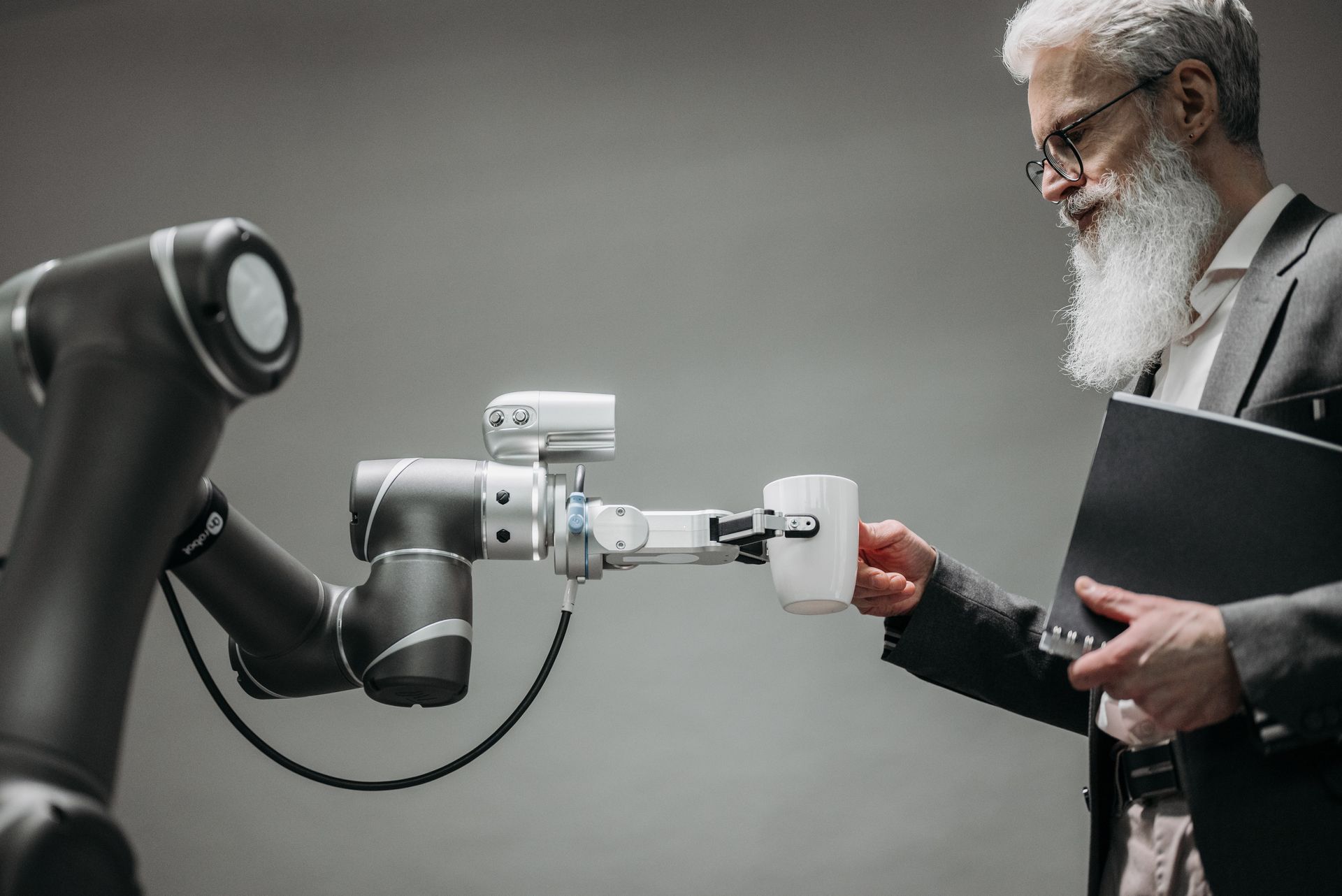Leveraging AI Agents to Revolutionize Maintenance and Reliability in Your Company
Leveraging AI Agents to Revolutionize Maintenance and Reliability in Your Company
In today's fast-paced business landscape, maintaining and optimizing assets is crucial for operational efficiency and profitability. The traditional methods of maintenance and reliability management often involve manual inspections and routine schedules, which can be costly and inefficient. However, with advancements in artificial intelligence (AI) and machine learning, companies can now harness the power of AI agents to streamline and enhance their maintenance and reliability departments. In this blog post, we will explore how to use AI agents and their functions to revolutionize your company's maintenance and reliability operations.
Understanding What AI Agents Can Really Do in Maintenance and Reliability
AI agents are intelligent software systems that can perform specific tasks or make decisions based on data and algorithms. These agents can be trained to automate routine processes, analyze vast amounts of data, and make predictions, ultimately improving the efficiency and effectiveness of maintenance and reliability efforts. Here's how you can leverage AI agents to transform your department:
Prescriptive Maintenance
One of the most significant advantages of AI agents is their ability to predict equipment failures before they occur. By analyzing historical data and real-time sensor information, AI agents can identify patterns and anomalies that may indicate impending issues. This proactive approach allows maintenance teams to prescriptively change operating parameters and schedule repairs or replacements at optimal times, reducing downtime and minimizing unexpected breakdowns.
Condition Monitoring
AI agents can continuously monitor the condition of equipment and assets, providing real-time insights into their health. They can analyze data from sensors, cameras, predictive tools and other sources to detect abnormal behavior or signs of wear and tear. This enables maintenance teams to take preventive actions or schedule maintenance when necessary, preventing costly breakdowns and extending the lifespan of assets.
Inventory Management
Maintaining an efficient inventory of spare parts and materials is crucial for minimizing downtime. AI agents can optimize inventory levels by predicting which parts are likely to be needed based on historical usage patterns and current maintenance schedules. This ensures that you have the right parts on hand when you need them, reducing delays and saving costs.
Resource Allocation
AI agents can assist in allocating resources effectively. They can analyze work order data, technician availability, and equipment priorities to assign tasks efficiently. By optimizing resource allocation, companies can reduce idle time, improve response times, cross train and ensure that the most critical maintenance tasks receive prompt attention.
Root Cause Analysis
When equipment failures occur, AI agents can aid in root cause analysis by examining historical data and identifying contributing factors. This helps maintenance teams understand the underlying issues and implement long-term solutions to prevent similar problems in the future.
Data-Driven Decision Making
AI agents can provide maintenance and reliability managers with actionable insights derived from vast amounts of data. These insights enable data-driven decision-making, helping organizations allocate resources more effectively, prioritize maintenance tasks, and optimize maintenance strategies.
Safety and Compliance
AI agents can also contribute to safety and compliance efforts by monitoring equipment and processes to ensure they meet regulatory standards. They can provide alerts and recommendations to prevent safety violations and mitigate risks.

Implementing AI Agents in Your Company in 6 Easy to Follow Steps
To harness the potential of AI agents for your maintenance and reliability department, follow these steps:
Step One,
Data Collection: Ensure you have access to relevant data sources, including sensor data, historical maintenance records, and equipment specifications.
Step Two, Data Integration: Integrate the data sources into a centralized platform or database for easy access and analysis.
Step Three, AI Model Development: Collaborate with data scientists and AI experts to develop and train AI models tailored to your specific maintenance and reliability needs.
Step Four, Deployment: Implement AI agents within your organization's existing systems and workflows, ensuring seamless integration with your maintenance operations.
Step Five, Training and Maintenance: Continuously train and fine-tune AI agents to improve their accuracy and effectiveness over time.
Step Six, Change Management: Educate and train your maintenance teams on how to work with AI agents and incorporate their insights into daily operations.
What Might Happen in the Future with AI Agents: Revolutionizing Maintenance and Reliability
As we delve deeper into the age of artificial intelligence, the potential for AI agents to revolutionize the maintenance and reliability industry is boundless. Here, we explore the future possibilities and trends that could reshape this vital sector:
Enhanced Predictive Capabilities
While AI agents today excel at prescriptive maintenance, the future promises even greater accuracy and precision. As AI algorithms become more sophisticated and trained on larger datasets, they will develop an unparalleled ability to forecast equipment failures, often months or even years in advance. This heightened predictive power will enable organizations to plan maintenance activities with unprecedented foresight, reducing downtime and costs to a minimum.
Automatically Performed Maintenance
Imagine AI agents capable of autonomously conducting routine maintenance tasks. These agents could utilize robotics, drones, or other automation technologies to perform inspections, minor repairs, and maintenance activities without human intervention. By delegating repetitive and time-consuming tasks to AI-powered systems, human technicians can focus on more complex, strategic, and value-added activities.
Cognitive Decision-Making
In the future, AI agents will evolve to continually enhance predictive and prescriptive methods. They won't just identify issues but will also recommend the best course of action. Minority Report anyone? These recommendations will be based on a holistic understanding of an organization's maintenance history, current equipment status, environmental conditions, and business priorities. This cognitive decision-making will enable maintenance teams to optimize their strategies and resources effectively.
Integration with IoT and Edge Computing
AI agents will continue to seamlessly integrate with the Internet of Things (IoT) and edge computing technologies. Edge devices, equipped with AI agents, will process data locally, reducing latency and enhancing real-time decision-making. This integration will enable maintenance and reliability teams to access critical information instantly, even in remote or challenging environments.
Digital Twins
Digital twins are virtual replicas of physical assets, and AI agents will play a pivotal role in their development and management. By combining real-time data from sensors and historical performance data, AI-powered digital twins will provide an accurate representation of equipment and assets. GE and other companies are already pioneering this process, see
Digital Twin Creation | GE Research.
Maintenance teams can simulate different scenarios and test maintenance strategies in a risk-free environment, leading to more effective decision-making.
Continuous Learning
AI agents will become more adaptive and capable of continuous learning. They will improve their performance and decision-making abilities by analyzing the outcomes of past recommendations and adjusting their algorithms accordingly. This iterative learning process will ensure that AI agents remain relevant and effective as maintenance and reliability challenges evolve.
Industry-Specific Solutions
AI agents will become increasingly specialized, offering industry-specific solutions tailored to the unique needs of various sectors. Whether in manufacturing, energy, healthcare, or aviation, AI agents will be fine-tuned to address specific maintenance and reliability challenges, optimizing processes and minimizing downtime.
Lastly, but perhaps the most important;
Ethical Considerations
As AI agents take on more responsibilities within maintenance and reliability, ethical considerations will become paramount. Organizations will need to establish guidelines and safeguards to ensure responsible AI usage, data privacy, and transparency.
Thoughts on incorporating AI agents into your maintenance and reliability workflow
The future of AI agents in the maintenance and reliability industry holds immense promise. These intelligent systems will continue to evolve, enhancing their predictive and decision-making capabilities, integrating with emerging technologies, and providing tailored solutions for various sectors. By embracing these advancements, companies can position themselves at the forefront of the maintenance and reliability revolution, driving efficiency, reducing costs, and ensuring the longevity of their critical assets. The journey has just begun, and the potential for transformation is boundless.
In conclusion, incorporating AI agents into your maintenance and reliability department can be a game-changer for your company. By automating tasks, predicting equipment failures, optimizing resource allocation, and providing data-driven insights, AI agents empower your organization to operate more efficiently, reduce downtime, and increase asset reliability. As AI technology continues to advance, investing in AI agents for maintenance and reliability can help your company stay competitive and adapt to the ever-changing business landscape. Embrace this technological revolution, and watch your maintenance and reliability efforts soar to new heights.
At Eruditio® we're always thinking ahead, for the most effective, low-risk training options in the Maintenance and Reliability Industry.
Link to Eruditio®'s
Training Schedule
Link to iBL® Course Registration and Information
All Rights Reserved | Eruditio®
All Rights Reserved | Eruditio®
Email: training@eruditio.com
Eruditio®
421 Wando Park Blvd Ste120,
Mt Pleasant, SC 29464
T (843) 375.8222 Eruditio®
Email: training@eruditio.com 421 Wando Park Blvd Ste120,
Mt Pleasant, SC 29464
Email: training@eruditio.com
Eruditio®
421 Wando Park Blvd ste120,
Mount Pleasant, SC 29464





